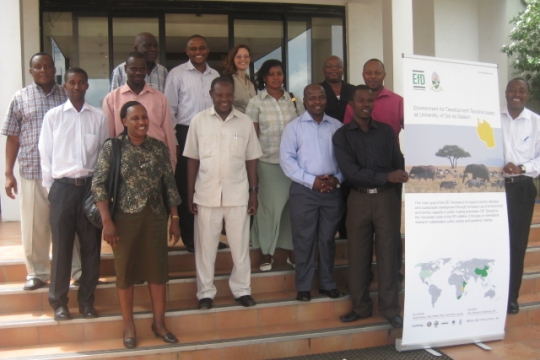Environment for Development Tanzania (EfDT), an initiative hosted in the Department of Economics at the University of Dar es Salaam, organized a one-day experts’ policy meeting, “Managing Tanzania's Natural Resources:
A Meeting addressing Forest management and REDD (Reduced Emissions from Deforestation and forest Degradation); and Marine Protected Areas,” on 17th May 2012 at Blue Pearl Hotel, Ubungo Plaza, Dar es Salaam. This Experts’ Meeting, to discuss the findings of three recent EfD-funded projects* in Tanzania that address forest management and marine protected area policy, is part of the centre’s on-going commitment to ensuring that its research is fully integrated into policy processes and the policy debate in Tanzania. The meeting was broadcasted on Milimani Televison and Radio, and was featured in the East African Business Week, read the full article, distributed by AllAfrica Global Media (allAfrica.com): http://allafrica.com/stories/201205220715.html
The meeting was attended by a broad range of policy makers and practitioners, including senior representatives from several of Tanzania’s marine protected areas; the Ministry of Natural Resources and Tourism; the Ministry of Water; Tanzania Fisheries Research Institute; the National Environment Management Council; and the NGO Tanzania Forest Conservation Group.
The meeting, organised by Mr Salvatore Macha, was chaired by Dr. John Mduma (University of Dar es Salaam) who welcomed the participants on behalf of the Head of the Economics Department, Dr. Mkenda, who could only attend the meeting briefly.
Dr Elizabeth Robinson (University of Reading, UK) and Mr Stephen Kirama (University of Dar es Salaam and EfD-T) gave presentations on forest management, fisheries policy, and common lessons from the two, based on EfD-T’s recent research findings. The meeting brought together experts from both forest and fisheries management, and so enabled the participants to highlight a number of commonalities and differences. One delegate pointed out that we should not be emphasising the management of forests and fish, but rather we should focus on managing the people who use these resources. Another delegate highlighted the problem of lack of funding and the importance of involving local enforcement groups from villages nearby the resource. Equity was also seen as an important issue for both forest and fishery users. One delegate noted that there was little equitable sharing of costs and benefits in joint forest management because local villagers were being asked to stop using the forests and take on the burden of enforcement whilst getting few if any direct benefits. In contrast, REDD (Reduced Emissions from Deforestation and forest degradation) funds were being shared amongst all households in REDD villages and the villages themselves choose how much to alloate to community projects and how much should b given directly to the villagers. But in the marine protected areas, funds are limited and typically not shared among all households but used to provide projects for a small number of households; or to enable gear exchange (large mesh for small mesh nets) for some but not all fishing households.
After these presentations and a dynamic and lively discussion, the participants formed two groups, based on their areas of expertise, to discuss in more detail issues raised by the earlier discussions. Ms. Gladness A. Mkamba, Assistant Director Forestry and Beekeeping Division, Ministry of Natural Resources and Tourism; and Mr. Elinami Monga,Tanzania Forest Conservation Group (TFCG), led a detailed discussion on implementing REDD in Tanzania. This working group highlighted several of the many complexities of implementing REDD in practice. For example, where charcoal and fuelwood are key drivers of forest loss, REDD will only work if demand for these fuels goes down, or there are alternative sources that do not lead to displaced degradation. And even if people protect their own forests, they may be tempted to use other villages’ forests and so they need to commit to complying with regulations at the scale of the landscape. Dr. Benjamin Peter Ngatunga, Director of Tanzania Fisheries Research Institute; and Mr. Kazimoto, Warden in charge of Tanga Coelacanth Marine Park, led a discussion addressing the practicalities of managing marine protected areas in more detail. They highlighted the importance of location; whether people are living in and around the marine protected area; the presence of mangroves as key drivers of how the parks must be managed differently even though they are under the jurisdiction of one single act.
Closing remarks were made by Dr. Robinson who expressed her sincere gratitude and appreciation for the active participation shown by the participants and thanked all participants for their contributions and comments throughout the meeting. The meeting was also attended by media representatives.The meeting was broadcasted on Milimani Televison and Radio, and was featured in the East African Business Week, read the full article, distributed by AllAfrica Global Media (allAfrica.com): http://allafrica.com/stories/201205220715.html
*The three projects are: Protecting Peri-Urban forests and livelihoods: Spatial Enforcement Issues and Incentives for Community-Based Initiatives; Improving the potential for successful implementation of REDD in Tanzania; and Assessing Tanzania’s Marine Protected Areas: Incentives, opportunities, and constraints.
